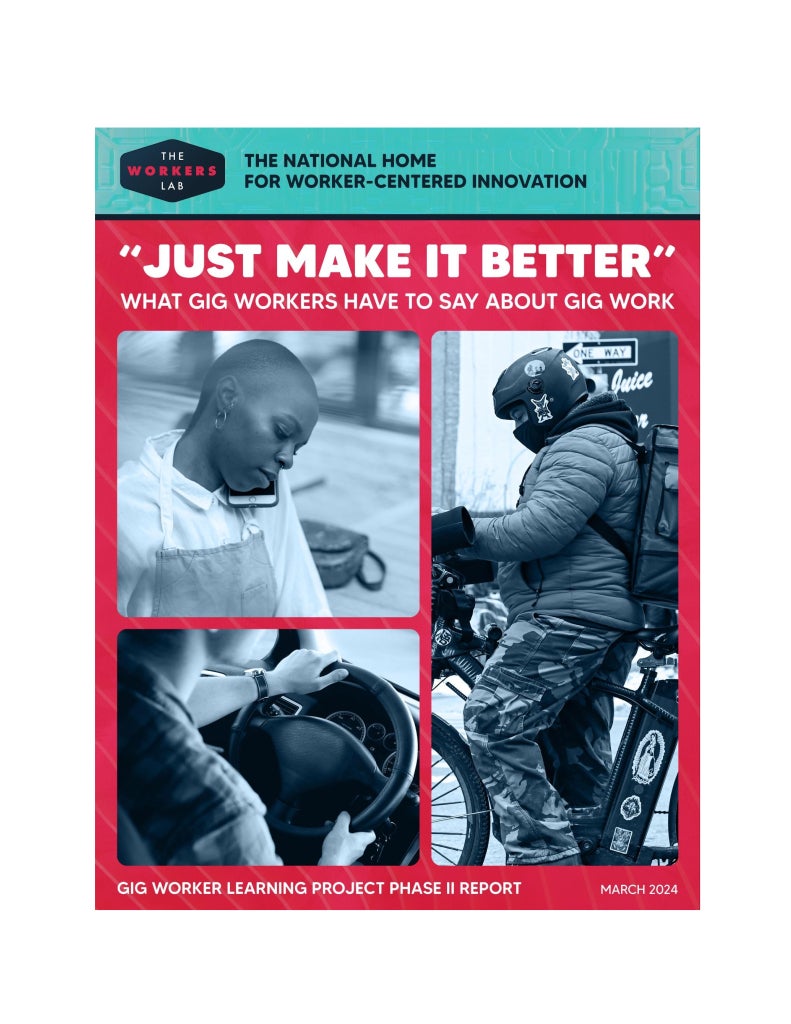Para leer esta página en español, haga clic aquí.
The Workers Lab is excited to share the phase-two findings of our Gig Worker Learning Project. The purpose of this effort is to understand more about gig work and workers directly from gig workers themselves – motivations to do gig work; challenges being faced; and solutions that would impact gig workers personally, their families, and their work. The first phase of the Gig Worker Learning Project produced an analysis of existing research and recommendations. The phase two findings presented in this latest report emerged from participatory research which included more than a dozen focus groups and several participatory analysis sessions led by an incredibly diverse set of workers. It marks the beginning of The Workers Lab’s plan to help build greater advocacy for gig workers nationally.
This project was inspired by the oft-noted, evidence-based reality that we really do not know how millions of people in this country work. The measures of gig and nonstandard work–or, as we come to call it in this report, excluded work–are messy and inconsistent. We rely mostly on categories and measures that were developed decades ago and based on a narrow, full-time, direct-hire, long-term employment model–a model that was only ever the norm for White men. Millions of workers struggle to see themselves in these measures. Day laborers, domestic workers, creatives, crafters, agricultural workers, adjuncts, platform drivers, pieceworkers, sex workers, seasonal workers, and more are made invisible, and the challenges they face go unsolved.
But it was not just a data problem that inspired us. It was also a feeling. The feeling that many of us do not see ourselves represented in simplified survey questions and binary categories. That the “solutions” we hear being talked about would not matter to us, because people with power have not listened to us, our families, and people like us.
This project brings together people who have had that feeling. It brings them together across different sectors, geographies, ages, racial and ethnic identities, gender identities, disability, and documentation statuses. Our research team, like our participant population, is made up of queers, immigrants, Black and Brown folks, and disabled folks. Questioning categories is not just an academic exercise in pursuit of an accurate number but also a part of our lives and identities, day in and day out.
This project is both by and for anyone who has not seen themselves reflected in monthly jobs reports, who’s ever been confused by a survey question, who’s been skipped over for an interview because of their accent or their stutter, who won’t answer surveyor phone calls for fear of being deported. It centers these experiences, these feelings, as the starting point for knowledge, as expertise as valid as peer review or representative sampling. The impact of this report, we hope, is the beginning of more productive problem-solving efforts among the people in power making decisions about gig work and workers – and that those efforts not be focused on the interests and experiences of institutions or companies or technology or robots, but rather unequivocally focused on these workers and their families who need gig work to be better work. It’s been a long journey to get here, with far still to go, until we reach a world where all work is good work and all workers are respected experts of their own lives, but we hope this report is one small step along the way.


